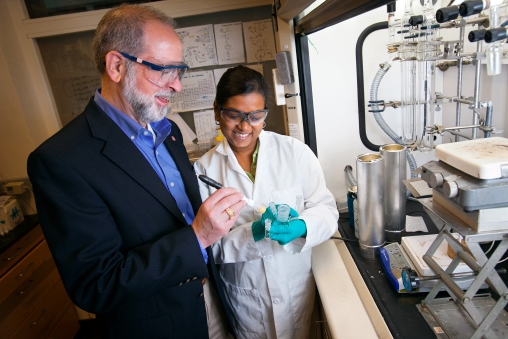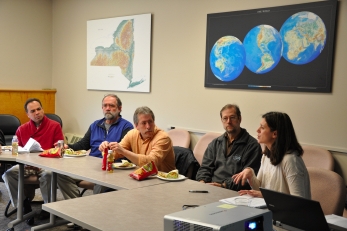COVER STORY SIDEBAR

Frank DiSalvo, the John A. Newman Professor of Physical Science and director of the Atkinson Center, in his lab with Chinmayee Subban, a graduate student in chemistry and chemical biology.
The Atkinson Center solutions factory: Up and running

Wendy Wolford, right, the Polson Professor of Development Sociology, leads an Atkinson Center Topical Lunch discussion on "Access to Land and Global Development" in 2010. From left are professors Karim-Aly Kassam, James Lassoie, Ken Roberts and David Kay. See larger image
In 2008, 15 professors from five Cornell departments spanning several colleges gathered over sandwiches and potato chips to brainstorm research approaches to the problem of mycotoxin-infected corn. Four years later, thanks in part to that lunch and an initial seed grant, one Cornell doctoral student gathered a mountain of data in Kenya, two Cornell professors are major players in a multinational study funded by the Australian government, and tens of thousands of Africans will be better protected from a toxin that stunts children's growth and can even be fatally poisonous.
The David R. Atkinson Center for a Sustainable Future has sponsored 60 such topical lunches, funded 50 research projects, and launched "mini fellowship" programs in agrarian transformation and sustainable biodiversity. Most impressive, perhaps, are the many interdepartmental working relationships the center has fostered and the research advances those teams have achieved in the center's four years.
Atkinson Center standouts
Energy
Plants as fuel: Bolstered by a $9 million award from the Department of Energy, biological and environmental engineering professor Beth Ahner, chemical engineering professor Ruth Richardson and molecular biology professor Maureen Hanson are part of a national research consortium improving production of biofuels using aquatic microalgae.
Waste as fuel: Supported by a $5 million gift from entrepreneur Yossie Hollander, crop and soil sciences professor Johannes Lehmann and his team investigate pyrolysis, which produces biofuels and biochar from waste like corn husks and chicken manure. "Cornell is a leader in many of the disciplines required to solve the oil scarcity problem in Africa," says Hollander, "and the ACSF was key to putting them together into a coherent and effective research program."
Environment
Good vibrations: Cited in The New York Times' 2010 "Year in Ideas" section, which highlighted the best advances and inventions of the year, the vibro-wind technology project led by six Cornell professors is investigating the harvesting of energy from wind that flows around buildings.
Temperatures rising: Climate warming drives outbreaks of infectious disease, posing a threat to human health, biodiversity, and the environment. Researchers C. Drew Harvell, Laura Harrington, Kelly Zamudio and Diego Ruiz-Moreno established a Disease and Climate Network with new tools to forecast mosquito-borne infections and climate-driven disease. The ultimate goal is to estimate the economic impact of outbreaks driven by climate change.
Development
Local foods best practices: Professors Miguel Gomez (from the Dyson School in CALS), Huaizhu Gao (a chemical engineer), Dennis Miller (chair of the Department of Food Science), Ardyth Gillespie (nutritional sciences), and Jonathan Russell-Anelli (a lecturer in crop and soil sciences) are developing a method for assessing the comparable sustainability of different food systems, with the hope of shedding light on U.S. food supply policy.

"We're matchmaking all the time. We're yentas," explains Professor Frank DiSalvo, the center's director. Two hundred seventy members of the Cornell faculty (representing 65 departments) are Atkinson Center fellows.
In 2007, the College of Agriculture and Life Sciences advisory council co-chaired by David Atkinson '60 recommended that Cornell create a sustainability center. Atkinson and his wife, Patricia, provided initial seed funding. Three years later, in 2010, an external panel reviewed the center's progress, concluding that it was "nothing short of remarkable."
Based partly on that glowing report and partly because Cornell is the highest ranking American university with an agriculture college and also excels in the very fields key to sustainability research, the Atkinsons committed $80 million to provide ongoing funding for the center. It was the largest single gift ever to Cornell's Ithaca campus from individuals.
"It's a hugely important gift, a transformative gift," says DiSalvo. "It makes us permanent. Nobody wants to partner with an organization that might not be around next year."
There has been no shortage of partners. In four years, the return on investment is 10 to 1: $9 million spent and $90 million won in external funding for faculty projects that resulted in new inventions, the novel application of math and engineering to conservation, and new understanding about poverty and its causes, to name but a fraction of the advances made by Atkinson Center-supported research.
This fall, the center launched the Impact through Innovation Fund (IIF), which will award grants, beginning in 2012, to faculty research groups that have already secured external partnerships to conduct mutually beneficial work that applies or informs Cornell research.
IIF grants will not fund projects that are already ongoing. "It has to be problem oriented, not discipline oriented," explains DiSalvo. "Our main goal is to help form teams that solve real problems."
The real problems are legion. This fall, the world population surpassed 7 billion. Approximately 3 billion people live in poverty. Every month, more than a million children die of hunger. Forests are disappearing. Species are dying out. The cost of fossil fuels poses environmental, strategic and economic challenges.
These are the sum of millions of smaller problems, most of which fall under the umbrella of sustainability. "We look at sustainability as a giant interconnected system you can't pull apart, or if you do, you're likely to get it wrong," explains DiSalvo. "Most major universities have an energy center. Many have some kind of environmental center, and then some have development or poverty centers. Cornell is almost unique in putting all the pieces together."